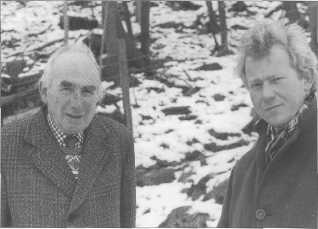| JOURNAL 1999 |
| North Craven Heritage Trust |
I first met Peter Colton in the summer of 1981, though 1 must have been aware of him before then, digging or planting out his herb garden at the old station house in Clapham. Once part of a thriving junction with its own sidings and signal box, the station house had reverted to a dwelling and the Ingleton branch line had been torn up after the Beeching enquiry in the 1960's. The introduction to Peter was through some mutual friends and he took a keen interest in all new arrivals in the Clapham village. At that first meeting - over a pint in the New Inn - a friendship began which lasted to his death in November 1998 and which also led to a close friendship with his son John Colton, a painter, climber and photographer.
Peter had moved to Clapham from the station at Bell Busk in 1954. Clapham captivated him and proved the end of his ambition. He stayed there as station master, then worked in the depot office at Skipton when the station became unmanned. He saw the change from steam to diesel locomotives and the move from intensive employment to rationalisation. But he maintained an unsentimental attitude to the railways which had provided him with a livelihood for his wife and three children; all of whom grew up at the station house and retained a strong affection for it.
Eventually Peter needed to escape the ghosts that haunted the old sidings and he decided to move. It was a protracted business which, amongst other things, involved transporting hundreds of paraffin lamp mantles still stored in his garage from the old station days. The house is now extended and modernised but then it was quite restricted and awkward and somehow we got the mattress of a double bed stuck in the stairwell. I was trapped upstairs at the time and only escaped by dismembering the mattress with the help of John, some pliers and a bread knife!
Peter vigorously rejected the ageing process and so retained an interest in younger people and their lives. We met him regularly, maintaining contact through all sorts of activities from Clapham Park Association to the Ingleton Peace Festivals held in the 1980's. A man of firm beliefs, he continued to read widely and when we weren't taking about cricket or the local gossip, we'd be discussing politics or literature. In his younger days Peter had been a key figure in the local amateur dramatics societies and had captained Clapham's cricket team in the 1950's with legendary ferocity.
He was inseparable from his Jack Russell, Knibs. It was impossible to ring Peter without Knibs answering the phone with an outburst of irascible balking before he even had time to open his mouth. It was typical of him to cherish such, an unruly canine character who ate almost the entire interior of two of his cars. We used to joke that the only way to complete an MOT was to have the dog x-rayed to locate the missing parts!
In the early 1990's Pete, then in late-sixties, was coaxed out of retirement as a tennis player. For a couple of years Peter, Eric Mason, Dr Farrer and myself met to play at the local court at eight o'clock sharp. Very few mornings were rained or snowed off and we played throughout winter and summer. That hour almost always provided a clear patch before the worst weather of the day and I was invariably greeted by Peter's wry grin as I arrived on the run after sleeping in after a late night. To the very end he remained a canny player, difficult even for a much younger man to beat.
Eventually Peter moved to Bentham with his partner, Ruby, where he continued to develop his artistic talents. Painting in water colours and drawing in pastels, he expressed his great love of the natural world and his work also featured portraits of a number of local people. One of my last memories is of visiting him in hospital when Sri Lanka were beating England in the 1998 test series. He'd lost the use of his voice but still managed to convey his irritation at the slackness of England's bowling performance through an eloquent mime show, indicating just where the ball ought to be pitched. As ever, such stern strictures were followed by an ironic grin.
I wrote the poem that accompanies this article sometime in 1984. When it appeared in my first book of poems I was afraid that it would give offence. Not a bit of it. Peter had a sophisticated enough sensibility to understand that it was only partly about him and mainly about time, change, and the healing processes of tending the earth. It still brings me a glimpse of him working alongside the half-timbered station house in that first summer of our acquaintance.

J1999p1_9_files/tmpBF8-5.jpg
Peter Colcon and Graham Mort at Trout Gill
Photograph: John Colton